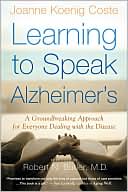List Books » Learning to Speak Alzheimer's: A Groundbreaking Approach for Everyone Dealing with the Disease
Category Books
- Fiction Books & Literature
- Graphic Novels
- Horror
- Mystery & Crime
- Poetry
- Romance Books
- Science Fiction & Fantasy
- Thrillers
- Westerns
- Ages 0-2
- Ages 3-5
- Ages 6-8
- Ages 9-12
- Teens
- Children's Books
- African Americans
- Antiques & Collectibles
- Art, Architecture & Photography
- Bibles & Bible Studies
- Biography
- Business Books
- Christianity
- Computer Books & Technology Books
- Cookbooks, Food & Wine
- Crafts & Hobbies Books
- Education & Teaching
- Engineering
- Entertainment
- Foreign Languages
- Game Books
- Gay & Lesbian
- Health Books, Diet & Fitness Books
- History
- Home & Garden
- Humor Books
- Judaism & Judaica
- Law
- Medical Books
- New Age & Spirituality
- Nonfiction
- Parenting & Family
- Pets
- Philosophy
- Political Books & Current Events Books
- Psychology & Psychotherapy
- Reference
- Religion Books
- Science & Nature
- Self Improvement
- Sex & Relationships
- Social Sciences
- Sports & Adventure
- Study Guides & Test Prep
- Travel
- True Crime
- Weddings
- Women's Studies
Learning to Speak Alzheimer's: A Groundbreaking Approach for Everyone Dealing with the Disease » (Reprint)

Authors: Joanne Koenig Coste, Robert Butler
ISBN-13: 9780618485178, ISBN-10: 0618485171
Format: Paperback
Publisher: Houghton Mifflin Harcourt
Date Published: September 2004
Edition: Reprint
Author Biography: Joanne Koenig Coste
Book Synopsis
This guide for families presents an approach to caring for people with Alzheimer's disease that emphasizes the importance of communicating with patients by focusing on their emotional language. Topics include, for example, understanding the diagnosis, respectfully stopping the patient from driving, establishing a plan of care, and enriching the patient's life. Supplemental information found in the appendix includes listings of support organizations and home health care products. Coste is a board member of the American Journal of Alzheimer's Disease Annotation © 2004 Book News, Inc., Portland, OR
Library Journal
After a major stroke left her husband paralyzed, unable to speak, and with significant progressive memory loss, Coste became his caregiver while raising four children. Refusing to institutionalize him, she developed a humanistic approach to caregiving ("habilitation") that focuses on enhancing the individual's remaining functional, intellectual, emotional, and spiritual abilities by creating a positive atmosphere that promotes feelings of success. Key elements of Coste's approach include simplifying the environment for the patient, capitalizing on his or her remaining skills, and making an effort to understand what life must be like for the memory impaired. Because such Alzheimer's behaviors as agitation and physical aggression are often rooted in frustration, she also offers caregivers techniques to help patients compensate for cognitive and sensory losses. Such methods include devising a daily routine filled with activities, physical exercise, snacks, and chores to reduce difficult behaviors and promote a good night's sleep. Directions for simple activities, recipes for nutritious "finger foods," and tips for hiring home caregivers are included. The level of care and involvement Coste describes is intense and may not be practical for all caregivers, but most activities can be modified to fit individual situations. A fine addition to Alzheimer's and caregiving collections. [Previewed in Prepub Alert, LJ 7/03.] Copyright 2003 Reed Business Information.
Table of Contents
| Foreword | xi | |
| Part 1 | Learning about Alzheimer's | |
| 1. | The Ticking Meter | 3 |
| 2. | Seeking a Correct Diagnosis | 13 |
| 3. | What to Expect: Making the First Decisions | 20 |
| 4. | Habilitation, the New Approach | 32 |
| 5. | Seeing the World from the Patient's Perspective | 48 |
| Part 2 | The Five Tenets of Habilitation | |
| 6. | Tenet #1: Make the Physical Environment Work | 61 |
| 7. | Tenet #2: Know That Communication Remains Possible | 77 |
| 8. | Tenet #3: Focus on Remaining Skills | 85 |
| 9. | Tenet #4: Live in the Patient's World: Behavioral Changes | 108 |
| 10. | Tenet #5: Enrich the Patient's Life | 127 |
| Part 3 | Beyond Habilitation | |
| 11. | Caring for the Care Partner | 149 |
| 12. | Receiving Home Care | 163 |
| 13. | Receiving Care Outside of a Family Home | 176 |
| 14. | Inspiration | 193 |
| Glossary | 203 | |
| Appendix | Good Food for People with Alzheimer's | 206 |
| Further Resources | 212 | |
| Index | 229 |
Subjects
 Diseases & Disorders
Diseases & Disorders  Alzheimer's Disease & Dementia
Alzheimer's Disease & DementiaHealth Books, Diet & Fitness Books
 Health
Health  Caregiving - Alzheimer's & Dementia
Caregiving - Alzheimer's & DementiaParenting & Family
 Aging & Eldercare
Aging & Eldercare  Caregiving - Alzheimer's & Dementia
Caregiving - Alzheimer's & DementiaParenting & Family
 Alzheimer's & Dementia
Alzheimer's & Dementia  Alzheimer's disease -> Popular works
Alzheimer's disease -> Popular works
